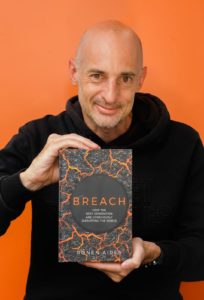click to dowload our latest edition
CLICK HERE TO SUBSCRIBE TO OUR NEWSLETTER


Published
2 years agoon
“Without radical change, our future looks bleak. But there’s a new force in the world that’s shaping our future.”
This force is Generation Z, people born in the last few years of the 1990s going into 2000 onwards, and high-performance coach Ronen Aires focuses on them in his soon-to-be-released book titled BREACH.

“What we’ve seen is their ability to become a collective force virtually and on the ground,” he says. “With this, they breach the status quo. What you’ll see over time is numerous attempts to make changes, some together with previous generations, while others led by this generation.”
Aires says South African youth between the age of 18 and 28 makes up a huge proportion of the country’s population. “There’s a youth bulge in many parts of the world. This group is your young voting pool, your early adopters, the ones who are still open-minded to buy your product, potentially going to work at your companies, and eventually being your leadership team. This is the real reason why you should take this group really seriously.”
We’re all similar in many ways, except that across the generations, there are differences, Aires says. “As if you were a device, you come with different settings. So, if you think of the difference between say, Millennials, and Gen Z, it’s as if it was a software upgrade in which certain bugs were fixed, and certain features enhanced. It’s not about slanting. One is not bad, it’s more about noticing some of the differences and noticing that it’s not a one-size-fits-all in each category. Whether a Millennial or Gen Z, there are different sub-groups.”
Millennials, born between the early 1980s and late 1990s, were the disruptive generation, dubbed “Generation Me”, Aires says. “They were seen as selfish, entitled, and disruptive. You could look at someone like Mark Zuckerberg, who is one of the huge disruptors of the generation.”
Gen Z is much kinder, Aires says. In his experience, this generation has been by far his favourite to work with.
“They’re a lot more aware of the world they’ve inherited. They know it’s in a mess. They also realise it’s up to them to be part of the solution. Millennials were often desktop activists, whereas the younger generation is action orientated and wanting to be part of creating a kinder, more compassionate world. It was born in a world where its members don’t remember not having technology and social media. It’s part of their DNA. They’re as comfortable in the virtual world as they are in the real world.”
The difference between Millennials and Gen Z emanates from Gen X being helicopter parents as a result of lacking emotional support during their childhood, Aires says.
Also, issues like climate change, poverty, unemployment, patriarchal systems, and corrupt governments are becoming more prominent, he says. “Young people are saying, ‘We don’t want you to want to be part of these old systems’. Millennials were very good at pointing out what was wrong in the world. Gen Z is similar, but it actually wants to be part of the solution. It may have been passed down from Millennial parents.”
Gen Z have taken to concepts like gender fluidity, whereas Millennials were all about certainty, Aires says. “Gen Z really want to fix the world and have a need for safety. What does this mean for, say, employers in the workplace? The good news is that you have energetic, innovative, enthusiastic, and smart young people coming through. At the same time, being used to almost immediate gratification through social media, they want their careers to happen at the same pace, so it’s hard to attract and retain young people.”
As Gen Z is very much values aligned, if a company doesn’t match their principles, its members will seek an alternative, Aires says. “This means companies really have to walk their talk. Young people will call them out if they sniff any inconsistencies. They will leave or make a big deal on social media, and companies face being cancelled if caught in the crossfire.”
One of Gen Z’s focuses is on destigmatising and raising awareness about mental health issues, making it okay not to be okay, Aires says. “For many decades, there has been a silent mental health crisis. The COVID-19 pandemic made things worse. You’ll see in companies and just in general a lot more compassion and attention to mental health issues, not just for young people, but across the board. In future, it will be okay to speak about it and seek support.”
A public speaker, activist, mental health advocate, and breathwork facilitator, Aires is the founder and chief executive of Student Village, a youth and student marketing agency based in Johannesburg.
Having worked with youth and leaders for more than two decades, he was inspired to write BREACH during the early stages of the COVID-19 pandemic.
“In the depths of despair, I received creativity, lucidity, and inspiration just regarding the changes that we were forced to make, and how youth were playing a part in recalibrating the new world,” Aires says.
“What I mean by this is if you think back to the early stages of our lockdowns, we were forced to stay at home, working remotely with flexible working hours. We collaborated, we had more empathy, and more compassion for each other. Things were very different. It was a massive change to how companies operated. But young people had been advocating for these changes for many years before this. I remember when I had the insight to write BREACH, I was lying on my couch with my laptop. I was on a Zoom call. I was thinking, ‘Here I am at home. I don’t have to be dressed up for work. I’m lying on a couch doing work. Netflix is on in the background.’ This is exactly what young people have been asking for.”
